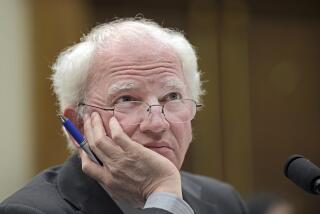Bar Procedures Do Little to Punish Incompetent Lawyers, Study Finds
- Share via
State Bar procedures for disciplining California’s 101,000 lawyers are largely inaccessible to the public and do little to ferret out incompetent lawyers, a public interest attorney appointed to monitor the discipline system reported Monday.
Atty. Gen. John K. Van de Kamp endorsed monitor Robert C. Fellmeth’s report and called the current disciplinary system “a Rube Goldberg kind of situation.”
“If you were to devise a system that would benefit the people charged, you couldn’t do a better job than you have now,” Van de Kamp said.
The attorney general appointed Fellmeth to study how lawyers are disciplined as part of a legislative mandate that requires the State Bar to reduce its backlog of complaints against lawyers by the end of this year.
Stripping Authority
Some legislators have advocated stripping the State Bar of its authority to punish its own members, but Fellmeth’s report indicated that the work can be left to the State Bar if improvements are made.
Fellmeth, of the Center for Public Interest Law in San Diego, said he will spell out specific recommendations for improvement in a future report. Meanwhile, in his report Monday, he suggested that the Bar install five to 10 toll-free lines for complaints, concentrate more on preventing violations and hire independent investigators and hearing officers instead of relying on volunteers.
State Bar President Orville (Jack) Armstrong said Bar officials are studying the suggested changes. Armstrong said he was “delighted” to have the report.
“One aspect pleased me because it confirmed what I have been saying. . . . The Bar can discipline attorneys, that we have made progress, that the Legislature must increase (Bar) dues to give us the resources and that we have been willing participants in cutting this backlog and that we welcome participation of others outside the Bar in achieving that.”
Avoided Listing
Although the discipline system is designed to protect the public from incompetent or unscrupulous lawyers, Fellmeth said, the Bar has “deliberately” kept the public from learning about its toll-free phone number for complaints, even avoiding listing it in telephone directories and with Los Angeles information.
If a citizen does find out the number from a local Bar association, Fellmeth added, he probably will have great difficulty getting through because surveys show the line is busy 60% to 75% of the time.
“Middle-level Bar staff is candid about the reason for the surreptitious implementation of consumer complaint channels,” he noted in the 300-page report. “The Bar currently has a serious backlog, and is under statutory deadlines to diminish that backlog. Increasing the incoming flow of cases jeopardizes that effort.”
Pending Cases
Armstrong said he believes that the Bar can meet the Legislature’s deadline to reduce the backlog by the end of the year. The backlog of pending cases six months or older stood at 2,439 about a month ago, down from the 3,000 two years ago when the Legislature first criticized the Bar’s lethargy and leniency.
Armstrong said the Bar is beginning to publicize the toll-free number and otherwise encourage public access to the discipline system.
Fellmeth criticized the Bar for doing little to uncover or prevent improper behavior of lawyers, including drug or alcohol abuse.
“A reading of hundreds of investigative files within the State Bar office generates one overwhelming impression: The detection and initial acceptance of the case for discipline depends on an aggressive and articulate complaining witness,” Fellmeth said.
Monitoring Needed
“Many categories of serious behavior not resulting in a criminal conviction,” he warned, “will not be detected unless pro-active monitoring and inquiry are conducted by the Bar.”
Fellmeth also criticized as “ill-advised” a Bar plan to have volunteer attorneys investigate discipline cases.
Because so few volunteers actually show up for training or investigate the cases assigned, he said, the whole exercise is like “getting one’s son to take out the garbage.”
“The constant reminding and nagging necessary to get the kid to take out the garbage often involves far more work than it would take to just take the garbage out yourself,” he said.
Fellmeth also criticized the disciplinary system for:
- Too many “stop points” or areas of review, which delay processing.
- A rush to close as many cases as possible, overloading investigators and delaying complex cases.
- Low salaries (about 20% under prevailing pay) for secretaries and lawyers, contributing to high turnover and low morale.
- Overly stringent requirements for approval of routine items by top administrators, delaying processing.
- Lack of a default system that could speed complaints when an accused attorney declines to defend himself.
More to Read
Sign up for Essential California
The most important California stories and recommendations in your inbox every morning.
You may occasionally receive promotional content from the Los Angeles Times.










